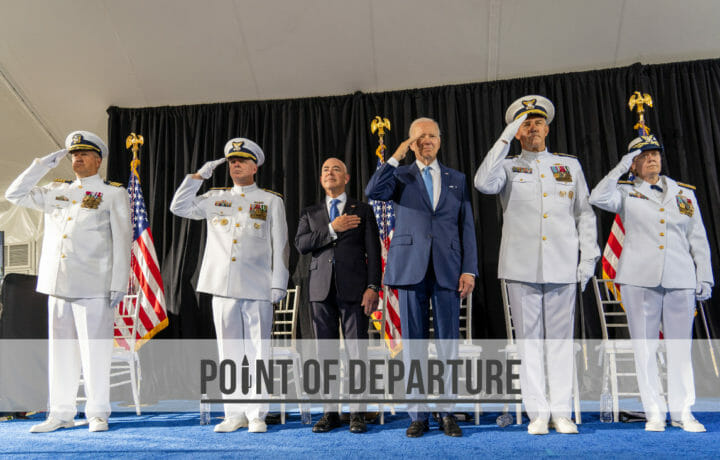When Admiral Linda Fagan assumed command of the United States Coast Guard recently, it was a moment of historic firsts. It’s historic enough to become a service chief, but she was also the first woman to lead the Coast Guard, not to mention the first woman to lead any branch of the Armed Forces.
But the ceremony was noteworthy for another reason. In keeping with tradition, Admiral Fagan wore shoulder boards passed down from another senior Coast Guard leader – those of Admiral Owen Siler, whose leadership invigorated that service at a crucial time in its history. In 1975, he also opened the doors of the Coast Guard Academy to women for the first time. “If it were not for Owen Siler’s courage,” she said during the change of command ceremony, “I would not be here today. I’m wearing his shoulder boards that he wore as commandant, just to acknowledge the long blue line.”
Siler – who passed away in 2007 – cast a legacy that will endure long after his memory fades. His shoulder boards proved a meaningful representation of a leader whose legacy continues to have impact decades after he left public service, and whose legacy will live on in future generations influenced by Fagan’s leadership as Commandant of the Coast Guard.
FAMILY LEGACIES
Legacy isn’t something most of us think about from day-to-day. We go about our business, living out our lives as we see fit. Some of us work to make a difference. Some of us work to elevate others. Some of us a work to leave the world a better place than it was. Some of us forge a legacy, but many more do not.
When I think about legacy, family often comes to mind first. That’s not uncommon, since family legacy is something that endures through generations through oral history, genealogy, and the images of those who came before us. A single family might have a legacy of military service or a long tradition of service to another profession, such as farming or education. Another family might have a less-desirable legacy, such as criminal behavior.
My own father emerged from a family legacy marked by poverty over successive generations. A high school dropout at 16, he used his Korean War service and GI Bill benefits to earn a degree in electrical engineering and propel him beyond that legacy, forging a new one built on an insurmountable work ethic and never say quit attitude. Two generations later, my own children carry that same legacy forward.
CASTING A LEGACY
Professional legacies are not all that different. They endure, for better or worse, based on the effort leaders commit to making a positive difference. Some legacies are cast deliberately, driven by purpose and meaning. Leading with a lack of purpose and meaning, however, can cast a much different – and less positive – legacy. Then there are those whose legacy is cast inadvertently, albeit positively, by their own actions to build others.
I recently wrote about one such person, my friend and mentor Pete Schifferle, whose role as a leader, teacher, and mentor touched so many lives over a lifetime of service. I doubt he ever set out to cast a legacy, but he did so in a powerful way.
As leaders, legacy matters. Ultimately, your success or failure as a leader will be measured in how well your people – and your organization – perform in your wake. With that in mind, a legacy mindset – leading today with an eye on the horizon – is essential. You need to think strategically; purpose and meaning have to underpin everything you do. Your actions, your decisions, all need to focus with both today and tomorrow in mind.
- Leadership is often defined in terms of purpose, direction, and motivation. But your influence is what casts your legacy. How do you use your influence? How do you leverage your influence to shape the next generation? Where can you focus your influence to forge the greater good?
- Casting a legacy requires an incredible amount of time and energy, especially if you want that legacy to matter. You have to be willing to fight for the things that make a difference, to maneuver through and around opposing agendas and motivations. You have to take the initiative, to lead from the front from the outset and never wait for circumstances to come to you.
- Legacy is like a lot of things in life – you get out of it what you put into it. If you truly want the most from your legacy, then you have to be willing to invest a significant amount of your time and effort toward that legacy. And the more people you touch, the greater that investment will grow. It’s important to understand and commit to that before you set out to cast your legacy.
- Motivation is central to leadership, and no less critical when legacy is involved. Set a path for your team that guides them toward success. Help your people build development plans. Teach them to set aspirational goals. And inspire them to achieve beyond their imagination.
To leave a lasting legacy that matters, you have to keep one thing in mind: it’s about them, not about you. To successfully cast a positive legacy, you have to accept that others must carry it forward. You cast the mold in your key talent and how well you develop them, how much you invest in their future. If you approach this thoughtfully and with purpose, you are well on the way to casting a meaningful legacy.



